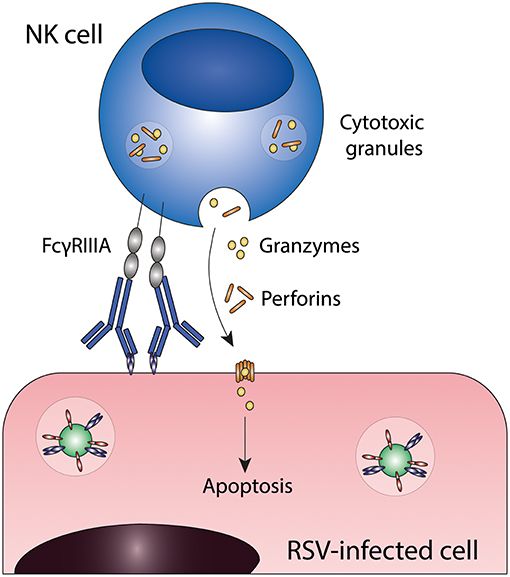NK cells are considered to play a central role in anti-tumor immunity, which recognizes target cells and destroys them within a few minutes in a mechanism called cytotoxicity. NK cells have been implicated play a role in anti-tumor responses through antibody-dependent cell-mediated cytotoxicity (ADCC) by the interaction of CD16 and with the Fc fragment of therapeutic antibody. To enhance NK cell-mediated ADCC, we have modified Ha-NK cells to express high-affinity CD16. In this way, engineered Ha-NK cells can enhance the therapeutic ADCC efficacy and show enhanced lysis of tumor cells.
Studies have shown that, compared with "low-affinity" CD16 patients, only 10% to 15% of the population will express the "high-affinity" protein of CD16, which is closely related to more favorable treatment outcomes. Besides, most cancer patients have severely weakened their immune systems due to chemotherapy, the disease itself, or some other factors. Therapeutic antibody therapy is designed to specifically target tumor cells, thereby helping to avoid the common adverse events of chemotherapy. These studies provide a rationale for the engineering of Ha-NK cells, especially when used with therapeutic monoclonal antibodies-based combination therapy.
At Creative Biolabs, we have established a unique NK cell platform that produces CD16 receptor overexpressed haNK, which is utilized as an "off-the-shelf" cell bank. Unlike normal NK cells, these optimized haNK cells demonstrated robust cytotoxicity in broad-spectrum antibodies-directed cancer therapy.

Fig.1 Mechanism of antibody dependent NK cell mediated cytotoxicity.1
Monoclonal antibodies bind to unique surface proteins on cancer cells.
The CD16 receptor on Ha-NK cells attaches to the monoclonal antibody previously bound to cancer cells and triggers the polarization and migration of cytolytic particles to cancer cell targets.
The cytolytic granule releases perforin and granzyme into the synapse between Ha-NK and cancer cells. Perforin punches holes in the cancer cell membrane, allowing granzymes to enter and degrade the cancer cells from the inside.
Destructive enzymes destroy cell membranes and internal mechanisms, including the nucleus with its genetic code. The cancer cells then swell and rupture, leaving only fragments.
Notably, as the leading cell therapeutics biotech that provides cell therapy related services, Creative Biolabs provides one-stop services for CAR-NK therapy development, including but not limited to:
If you are interested in our services, please send an email to contact us, and our team will get back to you as soon as possible.
Reference
For any technical issues or product/service related questions, please leave your information below. Our team will contact you soon.
All products and services are For Research Use Only and CANNOT be used in the treatment or diagnosis of disease.
 NEWSLETTER
NEWSLETTER
The latest newsletter to introduce the latest breaking information, our site updates, field and other scientific news, important events, and insights from industry leaders
LEARN MORE NEWSLETTER NEW SOLUTION
NEW SOLUTION
CellRapeutics™ In Vivo Cell Engineering: One-stop in vivo T/B/NK cell and macrophage engineering services covering vectors construction to function verification.
LEARN MORE SOLUTION NOVEL TECHNOLOGY
NOVEL TECHNOLOGY
Silence™ CAR-T Cell: A novel platform to enhance CAR-T cell immunotherapy by combining RNAi technology to suppress genes that may impede CAR functionality.
LEARN MORE NOVEL TECHNOLOGY NEW SOLUTION
NEW SOLUTION
Canine CAR-T Therapy Development: From early target discovery, CAR design and construction, cell culture, and transfection, to in vitro and in vivo function validation.
LEARN MORE SOLUTION